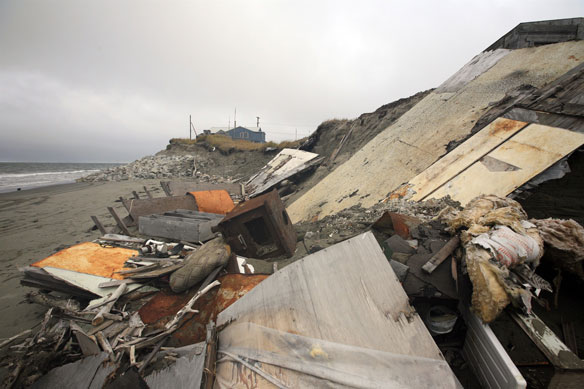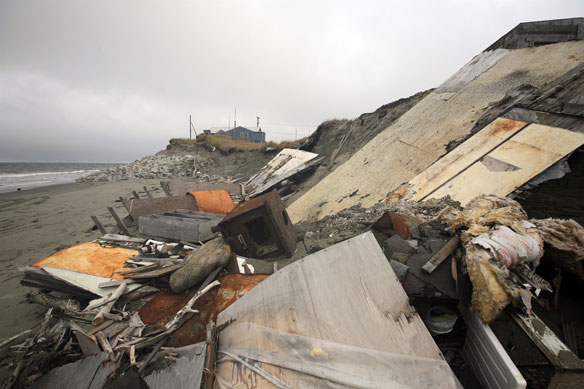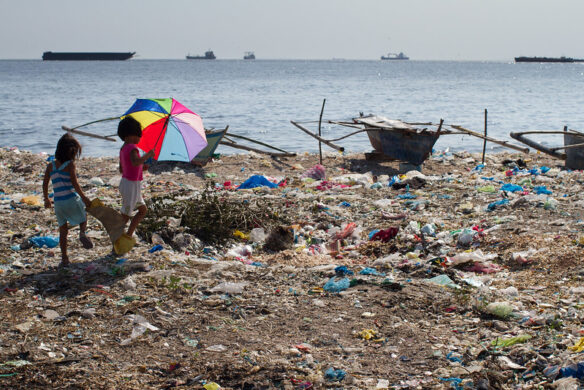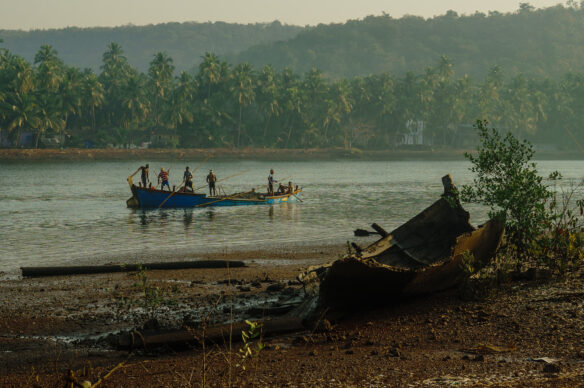
Alaska, houses collapsing due to coastal erosion. The village and homes are being destroyed by a rising tide, to the point where homes are being abandoned as they literally fall into the ocean. Residents can do nothing to stop the water as it approaches their homes. Captions and Photo source: ©© Laurence Hislop / UNEP
On the same coast than Kivalina, the village of Shishmaref in North Western Alaska, inhabited for 400 years, is currently facing evacuation due to rising temperatures, which are causing a reduction in sea ice, thawing of permafrost along the coast. The reduced sea ice allows higher storm surges to reach shore and thawing permafrost makes the shoreline more vulnerable to erosion. The town’s homes, water system and infrastructure are being undermined. Captions: NOAA
Excerpts;
As the planet warms, a remote Alaskan town shows just how unprepared we are…
Read Full Article, AP / Huffington Green
Court Rules Against Village In Global Warming Case, AP (09-21-2012)
A federal appeals court has ruled against the eroding northwest Alaska village of Kivalina, which sued energy companies over claims that greenhouse emissions contributed to global warming that is threatening the community’s existence…
Erosion doubles along Alaska’s Arctic coast, USGS (02-18-2009)
Coastal erosion has more than doubled in Alaska, up to 45 feet per year, in a 5-year period between 2002 and 2007 along a 40-mile stretch of the Beaufort Sea. A U.S. Geological Survey-led study reveals that average annual erosion rates along this part of the Beaufort Sea climbed from historical levels of about 20 feet per year between the mid-1950s and late-1970s, to 28 feet per year between the late-1970s and early 2000s, to a rate of 45 feet per year between 2002 and 2007. The authors proposed that these recent shifts in the rate and pattern of land loss along this coastline segment are potentially a result of changing arctic conditions, including declining sea ice extent, increasing summertime sea-surface temperature, rising sea level, and increases in storm power and corresponding wave action.
Around the world, as many as 150 million people may become “climate refugees” because of global warming, according to an Environmental Justice Foundation report, which attributes some of the moves to rising sea levels…
Human and Economic Indicators, Shishmaref, NOAA
The village of Shishmaref in N. Alaska, inhabited for 400 years, is facing evacuation due to rising temperatures, which are causing a reduction in sea ice, thawing of permafrost along the coast. The reduced sea ice allows higher storm surges to reach shore and thawing permafrost makes the shoreline more vulnerable to erosion. The town’s homes, water system and infrastructure are being undermined. “I went to school on the mainland, and when I came back, my house was gone. They moved it to the other side of the village, or it would’ve fallen in.” Leona Goodhope, Shishmaref, Alaska (from ACIA)….
Alliance between the Arctic and Tropics, Nutnatsiaq (02-25-2011)
Like the Arctic, small island nations account for a tiny percentage of world energy consumption and produce low levels of climate-warming greenhouse gas emissions. Yet they’re already threatened by the same kind of unpredictable weather, storms and erosion due to the changing climate that has some Alaskan villages relocating inland…









